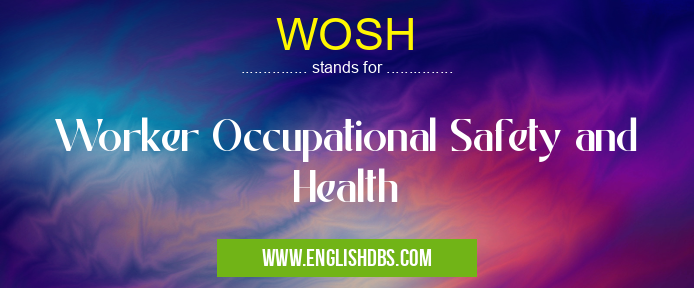What does WOSH mean in HEALTHCARE
Worker Occupational Safety and Health (WOSH) is an important part of workplace safety. It focuses on ensuring that workers are safe from hazardous conditions, including injuries, illnesses and other risks associated with the workplace environment. WOSH aims to provide a safe and healthy working environment for all employees, regardless of their occupation or industry.

WOSH meaning in Healthcare in Medical
WOSH mostly used in an acronym Healthcare in Category Medical that means Worker Occupational Safety and Health
Shorthand: WOSH,
Full Form: Worker Occupational Safety and Health
For more information of "Worker Occupational Safety and Health", see the section below.
» Medical » Healthcare
Benefits of WOSH
When employers take steps to ensure their workplace is safe through WOSH regulations and practices, they can reduce costs associated with having to replace injured workers or pay for expensive worker's compensation claims due to accidents or illnesses caused by hazardous conditions in the workplace. Additionally, providing a safe work environment can lead to improved morale among employees as well as increased productivity since workers will not have to worry about potential safety threats while performing their duties.
Essential Questions and Answers on Worker Occupational Safety and Health in "MEDICAL»HEALTHCARE"
What is Worker Occupational Safety and Health?
Worker Occupational Safety and Health (WOSH) refers to programs administered by employers and government agencies that aim to promote a safe working environment for employees. This includes ensuring that the workplace and equipment are free from hazards, providing protective gear and training sessions, as well as establishing emergency procedures.
How do employers promote WOSH?
Employers can promote WOSH by developing hazard assessment programs, implementing control measures, training their employees in safety procedures, conducting regular reviews of safety performance and providing workers with personal protective equipment.
What kind of hazards should be identified in a workplace?
Hazards can include physical or chemical hazards such as loud noises, extreme temperatures, sharp objects or hazardous substances like asbestos; biological hazards such as bacteria or viruses; ergonomic risks due to repetitive motions; psychological risks related to stress or fatigue; fire risks; and electrical risks caused by faulty wiring or other electricity-related dangers.
Are there any regulations for WOSH?
Yes. Each country has its own set of regulations governing worker safety in the workplace. For example, in the United States all employers must comply with the Occupational Safety & Health Administration's standards and regulations. Additionally, many states have their own worker safety laws that apply on top of Federal regulations.
How important is it for employers to train their workers on WOSH?
Training workers on occupational health and safety is essential for reducing the number of accidents in the workplace. This training should cover topics such as identifying hazards, proper use of protective equipment and procedures for responding to an accident or injury.
How often should a workplace review its safety protocols?
It is recommended that workplaces review their safety protocols at least once a year to ensure compliance with relevant legislation and best practices are being met. Additionally, risk assessment tools should be used regularly so potential threats can be identified before an accident occurs.
How can employers make sure employee health is taken care of?
Employers should take steps to ensure both physical and mental wellbeing are promoted within the workplace through adequate rest breaks, stress reduction opportunities during work hours, flexible leave policies when necessary and providing access to healthcare services if available.
What kind of protective gear do employees need when working with hazardous materials?
Employees working with hazardous materials may require special protective clothing such as chemical-resistant gloves, goggles or face shields depending on the type of material they are handling.
What happens if there's an accident at work?
In cases where there has been an accident at work it is important for employers to take appropriate action quickly in order to protect those injured while ensuring further harm does not occur. Depending on the severity first aid may need administering while police/ambulance services may also need to be called if necessary.
What other methods can be implemented aside from personal protection measures?
Other methods include installing barriers between danger zones such as walls or guardrails around machinery; properly labeling hazardous materials so they're easily identifiable; designing adequate ventilation systems; installing warning alarms; isolating dangerous areas from public access; creating signs indicating potential danger zones; and adhering to good housekeeping practices.
Final Words:
Overall, Worker Occupational Safety and Health (WOSH) is a critical component of any successful business. By adhering to WOSH standards, employers can help keep their workforce safe from harm as well as reduce costs associated with employee replacement or compensation claims relating to on-the-job accidents or injuries. Ultimately, this type of commitment to safety can lead to improved morale among employees and result in greater overall success for both employers and their organizations.
